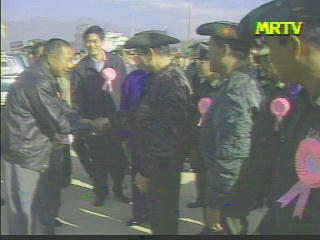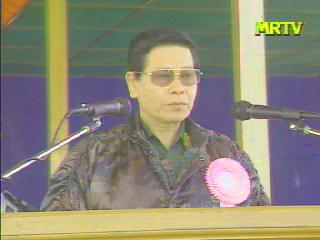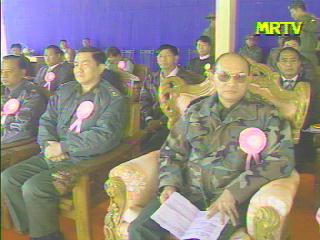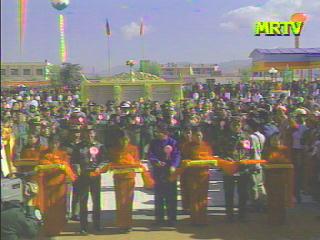Vicious cycle of
narcotic drugs will speedily if half is given to be constructive and
contributory to regional people to struggle free from evil dark shadows
Yangon, 27 Dec – An opening
ceremony of the Drugs Elimination Museum in Laukkai, Kokang Area, Shan State
North Special Region-1, was held at the museum today with an address by Chairman
of the Work Committee for Development of  Border
Border
Areas and National Races Secretary-1 of the State Peace and Development Council
Lt-Gen Khin Nyunt.
Also present at the opening ceremony were member of the State Peace and
Development Council Chairman of Shan State (North) Peace and Development Council
Commander of the North-East Command Maj-Gen Thiha Thura Tin Aung Myint Oo, the
ministers, the deputy ministers, the Colonel Air Staff, officials of the State
Peace and Development Council Office, Brig-Gen Zaw Win of Laukkai Station and
officers, diplomats of Russian Federation, France, Japan, Malaysia, Australia,
China and Singapore, the UNDCP resident representative, the director-general of
Liberal Democratic Party of Japan, the manager of the Central Union of
Agricultural Cooperatives, the professor of the Federation of Japan Noodle
Organization, local and foreign journalists, members of the Central Committee
for Drug Abuse Control, the Mandalay-based Consul of China, Kokang national
leader U Phon Kya Shin of Special Region-1 and other national leaders, national
leaders of the Special Region-1 and Special Region-3, guests from the Yunnan
Province of China, delegates of Myanmar Anti-Narcotics Association, district and
township departmental officials, families of Laukkai Station, members of the
Union Solidarity and Development Association, Maternal and Child Welfare
Association, Red Cross Society and Lashio Kokang Youths Social Affairs
Association, national cultural troupes of Kunlong and Laukkai, guests, teachers
and pupils, and local people totalling over 5,000.


Organizer of Kunlong USDA Daw Pyone Myint Han, the master of ceremonies,
announced the agenda in Myanmar and Kokang languages. Chairman of the Work
Committee for Development of Border Areas and National Races Secretary-1 of the
State Peace and Development Council Lt-Gen Khin Nyunt made a speech. He said:
First of all I would like to say that it is a matter of honour for the Union as
well as for Kokang area that a drugs elimination museum to educate and organize
the people has been opened on a grand scale even as it is endeavouring with
unrelenting tenacity to get rid of poppy cultivation and production in the area
of the national brethren of Kokang, at a time when the government, the national
race leaders in co-operation with the national people are striving as a national
duty to combat the scourge of narcotic drugs.
Moreover, I would like to say in succession that this Drugs Elimination
Museum would stand as a historical monument till the end of the world expressing
the Kokang national race leaders and regional people’s endeavours to get rid of
poppy cultivation and production once and for all and the Union’s national
resolve as well. It is to the knowledge of all that the fight is being waged
with great momentum, systematically according to plans, as a national duty by
the entire Myanmar people inclusive of all national races of the Union for
complete obliteration in all the Union of the evil of poppy cultivation and
production that had grown with roots taken in remote areas of the Union of
Myanmar due to colonialist influence. The narcotic problem in Myanmar is not
just an economic concern as in other countries but has various other influences
and political and social implications and is also connected with the way of
living of pure and honest regional national races and so demands most subtle,
broad and profound arrangements for its solution.
Accordingly the government has built national solidarity most firmly in
border areas, secured the whole-hearted co-operation of the regional people and
worked for narcotic drugs control arrangements in conjunction with the border
areas development programmes. As the anti-narcotic drugs arrangements have borne
fruit thanks to whole-hearted co-operation of the regional people on that
organizational basis, it has been possible to implement from 1999-2000 the
15-year Narcotic Drugs Eradication Programme aimed at total annihilation of
narcotic drugs in the country, further raising the momentum of success of these
arrangements. The 15 years limitation is for eradication of drugs in the whole
of the country and is calculated on the basis of resources in the country alone,
and so, if there be international co-operation, there will accordingly be
earlier completion of the targets. Likewise, there are region-wise target period
for eradication of drugs depending on their regional development situation and
progress of the socio-economic life of the national people, the people in
regions with earlier periods than the 15-year overall period are endeavouring
for success of works compatible to their regions.
That is why Shan State (East) Special Region (4) that is Mongla has declared
itself drug-free area in 1997 and Kokang too is striving to do so this year. It
will be seen the national races have been successful in eradicating poppy
cultivation and production thanks to emergence of good economic bases with the
successful undertaking of crop-substitution agriculture, livestock and other
productive enterprises by the State, in the border areas.
On the other hand, the State’s building dams, embankments, roads, bridges,
communications and energy development works, and more schools, hospitals,
libraries, television transmission stations and meeting of other social needs
has also helped to contribute towards progress in the life of the regional
people. Especially in Kokang area, success is being achieved in cultivation of
buck-what with special priority for substitution of poppy crop by the State.
Buckwheat was most successful when test-cultivated near Tarshwehtan Village in
Kokang Region in 1997 with the assistance of the Japanese Government, and it was
then extended and regenerated effectively, and the area under cultivation has
been increasing from year to year, with plans to grow 3260 acres in the year
2000-2001.


Above all that, sugarcane cultivation was undertaken with the assistance of
the People’s Republic of China, our neighbouring country, and it has been
cultivated on over 40,000 acres. Accordingly, no-poppy areas are being increased
from year to year and in these areas, sugarcane, buckwheat, peboke, corn, rubber
and paddy are being grown in substitution, in order that no-poppy areas may be
increased in cooperation with the regional people by national race leaders of
Kokang.
Today, it has got to the stage of successfully opening the Drugs Elimination
Museum that would effectively promote education of the regional people, that
plays an important role in poppy cultivation and production. Here at this
Museum, the people of the region will at a glance learn about Head of State
Senior General Than Shwe and responsible personalities’ guidance and views on
control of narcotic drugs, the State’s policies on narcotic drugs, the history
of narcotic drugs and the efforts to combat narcotic drugs by successive
governments.
Moreover the people of Kokang will also learn of success achieved in national
reconsolidation in the time of our Tatmadaw Government, and success achieved in
prevention and combating of narcotic drugs, all about the 15 year programme for
eradication of narcotic drugs and efforts of the work committees, government
departments and social organizations in agriculture and livestock activities.
All in all, this museum is sure to contribute effectively to efforts for
eradication of narcotic drugs, since it is going to promote the education and
the spirit of the regional people against narcotic drugs. So, in order to
effectively eradicate narcotic drugs in the given period, to keep up the
momentum of successfully changing spiritual, economic and social conditions, it
should be pointed out that not just the government, but friendly countries too,
need to provide effective assistance for regional development and provisions.
Moreover, as narcotic drugs pose a danger to all mankind, it is necessary for
all countries of the world to co-operate in the fight against narcotic drugs.
A review of the emergence of narcotic drugs in the country will show that it
started in the over hundred years of colonialism and then in successive stages,
neo-colonialists and anti-government organisations had deliberately made
concoctions to further expand and deepen the narcotic drugs problem. So it will
be seen that sincere and honest regional people, though involved in the evil
cycle of poppy cultivation, had not become rich, but on the contrary, poppy
cultivation had become just a form of livelihood for them to find their
subsistence for ages.
Today, with increased success in national solidarity, under the leadership of
the government, the national leaders and regional people are endeavouring hand
in hand in unison, and accordingly, there has been considerable successes in
regional development, economic progress and enhanced standard of living, so much
so that the regional people have become more enlightened, they see the evils of
narcotic drugs, and of their own will, they have gradually reduced their poppy
cultivation.
So I would like to say it will still be necessary to continue to help them
with assistance for regional development and economic progress to ensure a
smooth living in addition to organisational work to prevent a relapse of poppy
cultivation. It is especially necessary to effectively and most broadly help to
get the regional people themselves willingly combat and practically abandon
cultivation and production of poppy, with their conviction on the basis of the
region’s historical background and current situation. I would like to say that,
instead of pointing the finger at culprits of history and those who created the
evil results, but blaming as the culprits those who are practically suffering
the evils of this history, it will not be fair and just. It is sure that the
cycle of narcotic drugs will stop speedily if help is given to be constructive
and contributory for the regional people to struggle free from under the evil
black shadows, in order that they are entirely free from the dark shadows of
evils in history, in the past, in the region concerned.
It is firmly believed that, with economic development in border areas where
there had reigned the dark shadows of evils of past history, the regional
people’s life will rise higher, they become enlightened, and they will come to
realise the evils of narcotic drugs, and thus the targets of eradicating
narcotic drugs will be achieved in a short period of time. It is with this
conviction and with due consideration of the nation’s own resources that it has
been reckoned, and self-help measures taken, for annihilation of narcotic drugs
from the face of the Union of Myanmar in a matter of 15 years. For the success
of these endeavours, as is known to all, truly as a member of the community of
world nations the country has been actively co-operating with United Nations
organisations, regional countries, ASEAN countries and world nations.
Accordingly, in 1999-2000 poppy growing season, international organisations
have come to recognise that Myanmar poppy cultivation has been reduced by 31 per
cent and likewise poppy production has been reduced by 38 per cent and also
there has been reductions in seizures of poppy and heroin in all neighbouring
countries. Yet there are still finger-pointing and fault-finding accusations
made on the other hand, instead of helping us, ignoring the endeavours to fight
narcotic drugs being made by Myanmar even to this day.
I would like to say that there is no way other than mutual co-operation on
mutual understanding, rather than finger-pointing accusations against another
country, with the conviction that every nation is responsible as the
annihilation of narcotic drugs concerns all mankind of the world. As an example,
I would like to say that in no way can good results for annihilation of narcotic
drugs be achieved with fault-finding accusations and fabrication of critical
news stories blaming Myanmar in the matter of amphetamines that has got a great
market today.
In Myanmar there is utterly no production of ephedrine that is basic in
production of amphetamines and moreover the production equipment, technology and
skilled persons too came from other countries. Accordingly, in the fight against
drug abuse, not just the producing countries but those prompt and helping them,
those on business terms with them by pernicious greed, those with social ills
and evils of narcotic drugs, those making political profit between producers and
users all these countries must co-operate rather than heaping blame on one
another, for only then will there be a genuine cessation of narcotic drugs.
So I would like to urge all to co-operate without saying whose fault it is,
without pointing accusing fingers against any, in the fight against narcotic
drugs. As the Union of Myanmar is systematically implementing the 15-year
programme to eradicate narcotic drugs to be totally free from the scourge of
drug abuse, it will carry on with the work of eradicating poppy cultivation and
production, annihilation of drug abuse, and combating the scourge of narcotic
drugs, and not just that but for educating and organising the regional people,
regional development, a high level of economic life of the people and
co-operation with countries of the world.
In conclusion, I would like to say
– It is necessary to carry on from the newly opened the Drugs Elimination
Museum to educate and organize the regional people to see the evils of narcotic
drugs and clearly see the work they have to do for eradication of narcotic
drugs.
– the regional national race leaders and the regional people are to strive in
accord with the programme for eradication of narcotic drugs and for peace and
security of life, as the government will be doing so with unswerving
determination to achieve the targets of eradication of narcotic drugs.
Next, Chairman of CCDAC Minister for Home Affairs Col Tin Hlaing delivered an
address. He said that after the second opium war in 1842, Yunnan Province was
allowed to grow poppy, and poppy cultivation spread in Kokang region contiguous
to Yunnan since then. While endeavours are being made to eliminate illegal
cultivation and production the problem of stimulant drugs arose in 1996, and the
precursor chemicals are smuggled into Myanmar from the neighbouring countries.
Col Tin Hlaing noted that the producers and investors engaged in this illegal
trade are those from foreign countries and that with UNDCP assistance, law
enforcement agencies can take more and more arrests, and the drug control
measures are being undertaken with the assistance of UNDCP and Japanese
government and in cooperation with neighbouring countries. In conclusion, he
stated that plans are under way for elimination of narcotic drugs in the region
in the near future through the cooperation of the CCDAC, the Ministry for
Progress of Border Areas and National Races and Development Affairs, all other
ministries and NGOs.
Afterwards, Kokang national leader U Phon Kya Shin spoke at length on the
efforts for building the Drugs Elimination Museum and regional development
activities. He said: Since the mid-19th century, the entire world has paid
attention widely  to
to
the problem arising from the narcotic drugs. This has been due to physical and
spiritual ill effects caused to the human beings and consequential social
conflicts and instability. Hence, the issue of narcotic drugs control has become
the concern of each and every nation. We are here today to analyze together this
specific issue.
On 11 March 1999, Secretary-1 Lt-Gen Khin Nyunt and myself laid the
cornerstone of this Drugs Elimination Museum and its construction then began.
We have built this museum with the aims of educating the public through the
display of photographs featuring how the poppy growing practice originated, the
ill-effects of narcotic drugs and measures taken for narcotic drugs control. It
will continue to exist to serve public interest in the long run.
Kokang area was confronted with the danger of narcotic drugs posed to the
mankind and the extent of the ill effects which the area suffered would
certainly be more, and not less than that of other areas.
After realizing the need to take drastic measures to guard against the danger
of narcotic drugs, which resulted from the spread and the threat of narcotic
drugs in the area, we have decided to launch anti-drug measures in all
seriousness.We have also laid down anti-drug programmes in conformity with the
area’s practical conditions and are implementing the plans step by step.
Initially, educative programmes were carried out to make the public aware of the
grave danger of narcotic drugs and their negative impact on the people.
Moreover, relevant policies have been laid down and drug laws and punitive
measures introduced.
In implementing these action plans, opium refineries, opium refining
instruments, chemicals and narcotic drugs were put to torch several times in
Monkoe and Kokang regions.
The poppy free zone campaign was launched starting from 2000 in order to
implement the objective for eradication of narcotic drugs from the stage of
combating narcotic drugs.
As peace and tranquillity prevails, about ten years’ efforts have brought
about changes, but it is not at all easy to root out poverty and backwardness.
The history of the region shows us that majority of the people earned their
living through poppy cultivation. As we strive for wiping out poppy cultivation,
most of the people face poverty. This is a practical problem. The leaders like
us must necessarily see to this problem to find solutions. Of the bags of rice
displayed at today’s ceremony, some are provided by the government, and some by
Yunnan Province, China. For this, may I express my thanks. Most of the remaining
bags of rice were collected through various ways, and they are to be given to
the people facing insufficiency of food for they can no longer live on poppy
plantation. This amount of rice, however, is inadequate for the people living on
cultivation of poppy in Laukkai region. As far as we know these days, there are
those moving to other regions in search of jobs individually as well as entire
families going to other places. We cannot help but feel sorry for them, for we
have no way yet to persuade them not to leave. Catering for the people to have
adequate food, clothing and shelter need is the greatest challenge in
eradication of narcotic drugs.
” Eradication of narcotic drugs ” is concerned with the
international community. To eradicate narcotic drugs threatening the humanity is
the duty of all human beings. As for us, we will do our utmost to eradicate
narcotic drugs in the region. As we have vividly seen our goal and set our aim
for eradication of narcotic drugs, we will implement action plans to turn our
region into a zone totally free of narcotic drugs in the very near future.
Throughout the history of our region, the people have experienced a sort of
low living standard, being in poverty, due to geographical condition, difficult
access, backwardness in culture and technology and long-term armed conflicts in
the recent years. Thus, we have to face a lot of difficulties and challenges in
the fight against narcotic drugs. We need a great amount of the government’s
support to be able to work well with the project. At the same time, we need
understanding and assistance of international organizations and other social
organizations. Let us all strive for emergence of a clean community free of
narcotic drugs threatening the humanity by working together in the historically
significant project by the turn of a new century.
After Myanmar had lost her independence in 1886, the colonialists allowed
growing of poppy in the east of Thanlwin River and caused the hilly regions to
be unaffected by the opium law.
After independence had been regained, the region could not escape from the
poppy cultivation as it was not peaceful and it lagged in development in various
sectors.
He spoke of the reasons poppy cultivation had been maintained as the main
source for their livelihood. Mongla Special Region 4 that declared itself the
opium free zone on 22 April 1997 moved other regions and affirmed the
determination of ethnic minorities leaders for elimination of poppy cultivation.
This led to the campaigns and actions for drug-free movements in Kokang and
Wa regions. Kokang national races formerly residing on the hills moved to the
plains in Laukkai to grow sugarcane and this was one of the favourable
conditions for elimination of narcotic drugs.
Unfortunately, the world’s sugarcane market collapsed affecting many
countries including China, and the poppy substitute sugarcane growers lost a
great deal in spite of their successful crops and then they felt rather
reluctant to go on with sugarcane.
Buckwheat cultivation is becoming more and more successful year after year
and today over 3,000 acres can be put under the crop. As the crop is grown with
the assistance of the Japanese government and the produce is purchased by the
sponsor, there can be no concern about the market.
Col Tin Hlaing noted that the quality of buckwheat grown in the region is the
highest in the world market, it is supposed to be the most appropriate crop and
the cultivation project must be expanded.
Action plans for elimination of narcotic drugs are gaining momentum, and
Mongla region, for example, is witnessing development in various sectors. Though
the region also experienced loss due to the collapse of sugarcane market, they
could support their own economy with the achievements in other sectors.
He said that though Wa region is larger and has some difficulties in
transport, it has set the aim to make it totally free of narcotic drugs by the
year 2005. He also spoke of the success being achieved in agriculture and
livestock projects, and noted that due to the success in swine farming in
Kengtung and poultry farming in Tachilek, they duly achieved an FAO award.
The Secretary-1 presented honorary medal of CCDAC to Kokang national race
leader U Phon Kya Shin.
Chairman of CCDAC Minister Col Tin Hlaing presented a certificate of honour
to U Phon Kya Shin.
Minister Col Thein Nyunt presented food, rice, salt, seeds, strains of paddy
and corn for cultivation of opium substitute crops to U Phon Kya Shin. U Phone
Kya Shin presented badges to mark the opening of Drugs Elimination Museum to the
Secretary-1, the commander and the ministers.
The Secretary-1 formally unveiled the stone plaque of the museum. The
commander, Minister Col Tin Hlaing and U Phon Kya Shin formally opened the
museum. The Secretary-1 and party then set free doves. The Secretary-1 and party
inspected booths and signed in the visitors’ book. The Secretary-1, the
commander, the ministers, the deputy ministers and ambassadors and Kokang
national race leaders posed for documentary photo. The Secretary- and party
observed threshing, milling and production of buckwheat. There are seven booths
at the three-storey museum.
_________________________________